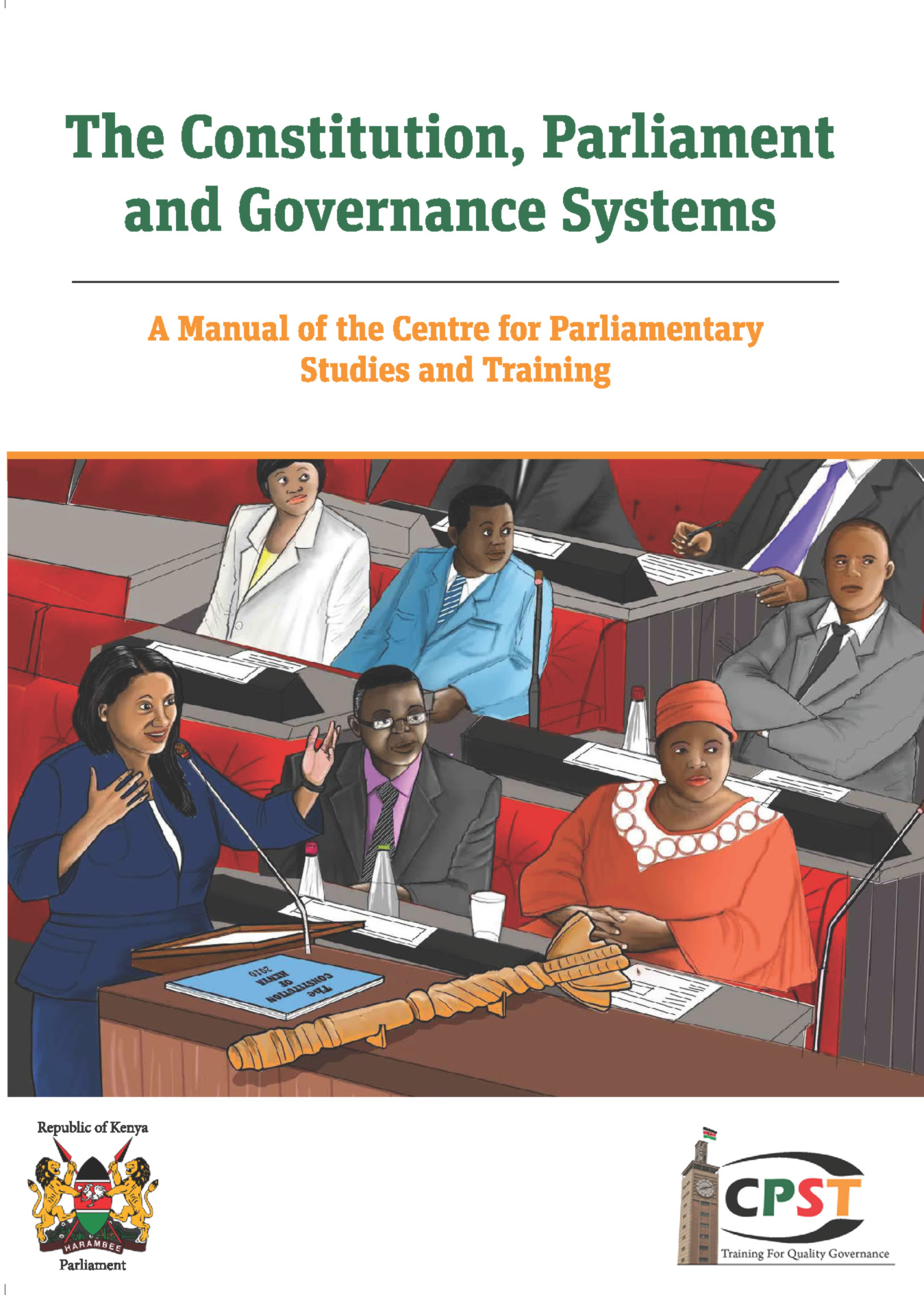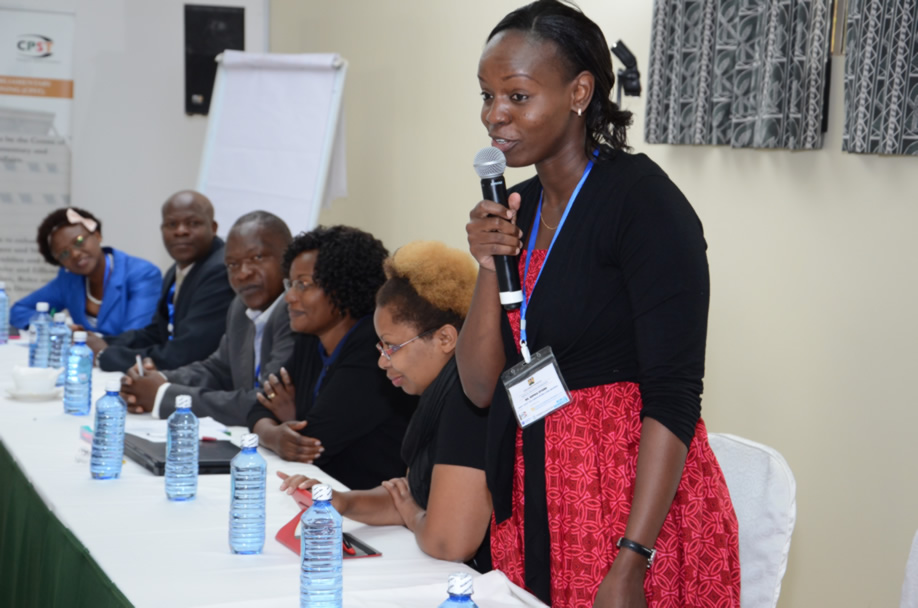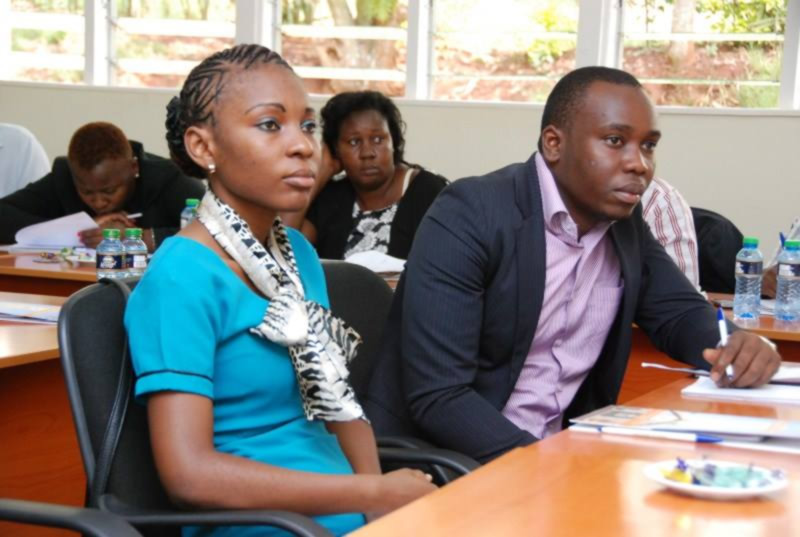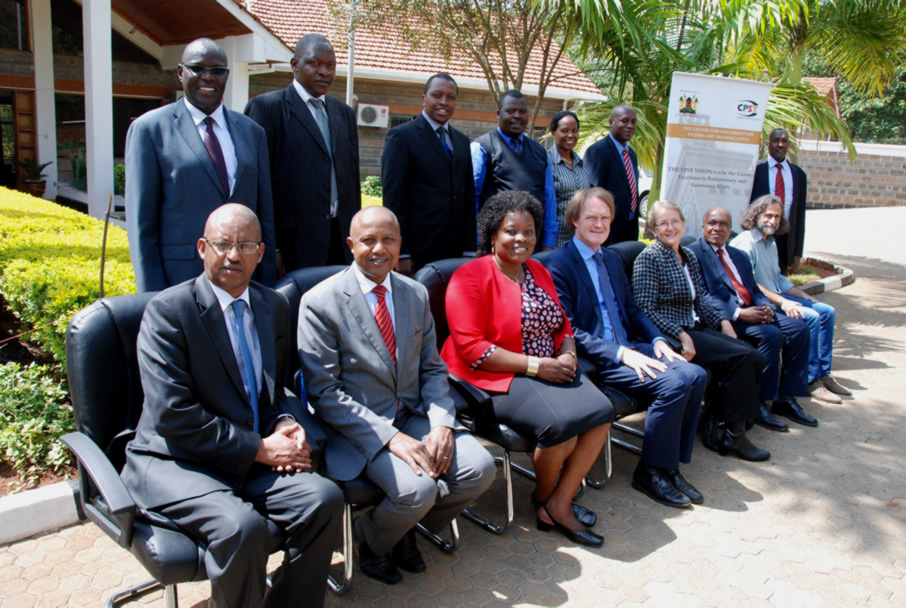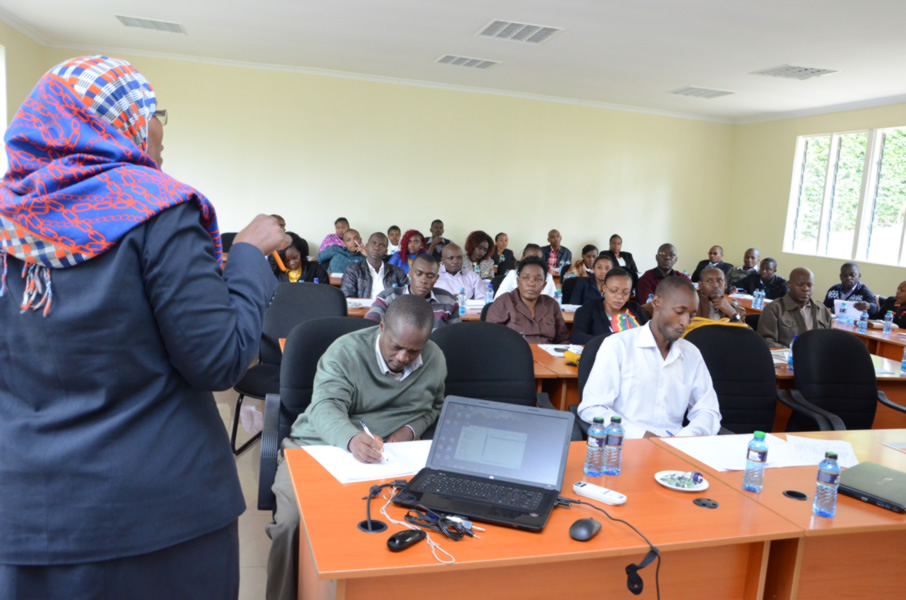Manual Highlights
Acknowledgements
This Manual on the Constitution and Systems of Governance has been prepared with the support and generous contribution of many individuals and organisations. We immensely appreciate the generous financial support of the Ford Foundation; State University of New York (SUNY) Kenya; Westminster Foundation for Democracy (WFD), and UN Women. The involvement of these organisations is a clear demonstration of their strong commitment to capacity building for the legislatures in Kenya and the region. My sincere appreciation goes to the Resident Representatives of these organisations Mr Maurice MakOloo, Mr Francis Aywa, Ms Hope Muli and Mrs Zabib Kavuma respectively.
About this Manual
This training manual examines the concepts of constitution, parliament and Systems of Governance as collective decision making and policy execution in Kenya. It delves into the evolution, norms and processes to the delivery of public services.
CPST 100:
-
Foundations and Fundamentals of Parliament
DetailsCourse Duration: ... HoursThis course intends to equip participants with requisite knowledge of Parliament in Kenya, the roles and responsibilities of representatives and the exercise of separation of powers to enable them fulfil their constitutional mandates effectively.
The concept pf Parliament has its origins in the French word parler which translates ‘to talk’ or ‘to discuss’. It was later to evolve institutionally as an assembly of representatives, discussing diverse issues of the state. Its role could be broadly categorised as Representation, Legislation and Oversight.
CPST 101:
-
Legislature and the Constitution of Kenya 2010:
DetailsDuration: ..... HoursThis module exposes the participants to the key issues that have shaped the journey for constitutionalism in Kenya. It delves into the philosophy, principles, values and the key pillars of the Kenyan constitution.
In the modern state system, the constitution-making process remains a fundamental aspect of achieving statehood. With the creation of the state, the citizens surrender their rights to the authority of the state on condition that the state thereafter guarantees them their security. In order to achieve which this, it becomes imperative that a set of institutions be set up through the citizens could hold the state authority accountable and responsive to their needs.
CPST 102:
-
Devolution and Bicameralism:
DetailsCourse Duration: 22 HoursIn many discussions, the terms Devolution, Decentralisation and Federalism are used as if they are synonymous in explaining the organisation of the State. The fundamental basis of Devolution is to determine the extent to which the traditional power and authority of the state (the power to tax, spend, regulate, provide and deliver services, control, distribute and redistribute resources and define and enforce rights) are widespread and dispersed across a range of national, sub-national, regional, provincial or local governments. On the other hand, the concept of Bicameralism refers to the practice of having two legislative or parliamentary chambers. In most jurisdictions, specific reference is made to Lower and Upper Houses of Parliament.
The purpose of this course is to furnish participants with relevant skills to facilitate effective fulfilment of their mandate. This course caters for the study and needs of legislators and parliamentary staff. The course addresses various aspects of Devolution and Bicameralism, i.e., the concepts, rationale and processes.
The constitution specifies the role of the legislature and its relationship with the executive in matters PFM. Constitutions and budget laws elaborate on the budgetary roles and powers of the legislature. Legal constraints and budget practices vary greatly from country to country and moreover, in many countries such as Kenya, the legislature is increasingly playing a prominent role in budget matters.
CPST 108:
-
Legislature, Political Parties and Interest Groups:
DetailsDuration: ...... HoursSocial movements are important vehicles that mobilise and organise people around particular interests. Among these are Interest Groups and Political Parties. Interest Groups are organisations that are formed to promote and pursue particular interests. In many cases, interest groups do not generally support particular candidates for elections but seek to influence government policy or legislation. They can also be described as ‘lobby groups’. Sometimes, they exist as ‘pressure groups’ of civil society. The aim of interest groups is to influence the people who actually have the power to make decisions. These groups provide a means of popular participation in national politics between elections. They are sometimes able to gather sufficient support to force government to amend or repeal legislation or even change policies. There is considerable evidence of successful interest group campaigns that have changed government policies and the law.
This course seeks to improve the participant’s understanding of how political parties and interest groups can influence policy and legislative agenda in Parliament. The course, therefore, would enable legislators to know the role and place of these interest groups as well as how to engage with them.
CPST 112:
-
Ethics, Integrity and Governance:
DetailsDuration: 8 HoursThe absence of acceptable levels of ethics and integrity in individuals and institutions has been witnessed in Kenya for a while. The reality has manifested itself in things like lack of accountability and transparency, which are themselves manifestations of poor governance. To deal with this problem, the Government of Kenya has put in place various measures from time to time including enacting anti-corruption laws and setting up of anti-corruption institutions and other agencies that are expected to promote corruption prevention and good governance. These efforts started with the enactment of the Prevention of Corruption Act 1956 that was repealed in 2003 when the Anti-Corruption and Economic Crimes Act was enacted. Other anti-corruption laws include the Public Officer Ethics Act 2003 and Ethics and Anti-Corruption Commission Act 2011. The enactment of the Constitution of Kenya 2010 in particular has great significance as a national effort to advance ethics, integrity, anti-corruption and good governance.
This course is meant to encourage ethics and integrity based attitudes and behaviour among parliamentarians, parliamentary staff and other citizens. It is in particular meant to expose the virtues of integrity, positive organisational culture and discourage parliamentarians or any other citizen from participating in or abetting corruption. The course presents corruption as a vice and offers ideas both from local and international experiences on how public organisations including parliament, civil society organisations and individuals can participate in preventing corruption and thus promoting ethics, integrity and good governance.
CPST 117:
-
Legislature at National and Supranational Levels:
DetailsDuration: ... HoursEvidently, regional integration schemes have also incorporated regional parliaments as actors where a common platform is found for wider discussions and consultations. Regional parliaments have been formed alongside regional integration organisations such as the East African Community (EAC), the Economic Community of West African States (ECOWAS) as part of the citizen involvement and participation.
Parliament is an important institution in the process of democratisation. It provides an avenue through which the citizens are represented in decision making processes, serving as platforms for debates and engagement, holding leaders accountable and interrogating policies and decisions in as far as they advance public good.
-
CPST stands for?
Centre for Parliamentary Studies and Training


